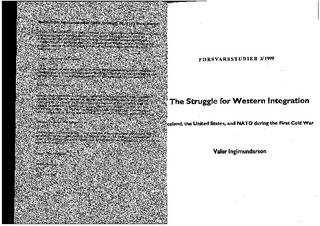| dc.description | The study deals with the military integration of Iceland into the Western Alliance, 1945-60. It focuses on several turning points in Iceland’s relations with the United States and NATO during the First Cold War: the debate over the withdrawal of U.S. troops in 1945-46; Iceland’s entry into NATO in 1949; the arrival of U.S. troops in 1951; the demand for the revocation of the U.S.-Icelandic Defence Treaty in 1956, and the stabilization in the bilateral relationship in 1959-60. It will be argued that two central theories capture the dynamics of Iceland’s relationship with the United States during this period. The national security thesis and the “Empire by Invitation” thesis. The purpose is to address four key problems.
First, the study assesses the military importance of Iceland during this period. Secondly, it explores how ideological affinity, especially anti-Communism, shaped U.S.-Icelandic cooperation. Thirdly, it attempts to detect the international and domestic sources of Iceland’s policy toward the U.S. Finally, it examines the political forces that contested U.S. influence in Iceland. | no_NO |
